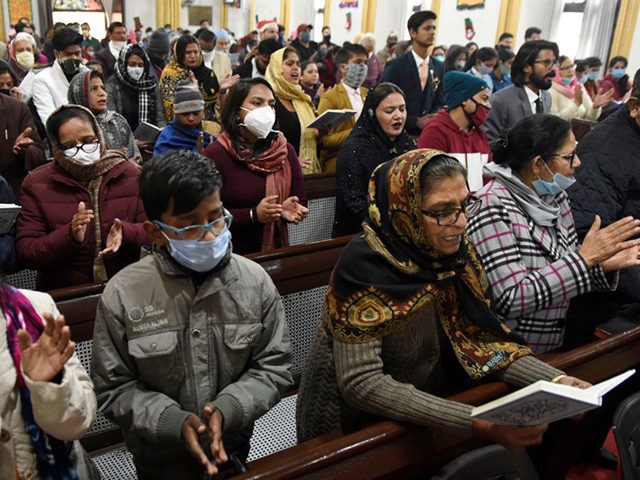Christians are still facing serious persecution in India in 2023, including attempts by Hindu mobs to drive Christian residents completely out of some villages.
Hundreds of Christians have been arrested for violating “anti-conversion laws” and the central government is slow-walking its response to a court order demanding a full report on the extent of Christian persecution.
An especially large protest rally was organized by a hundred churches in February, bringing 15,000 to 20,000 participants to New Delhi to call for an end to attacks on Christians and their houses of worship. The organizers said they wanted to draw the Indian parliament’s attention to “the sharp escalation of targeted hate and violence against Christian communities in many states.”
Archbishop Anil Couto of Delhi told reporters covering the rally that it was necessary to “demand judicial and government intervention to check the rapid rise in incidents of violence, coercion and false arrests of our people.”
“We’ve gathered here peacefully because we want to share the anguish of our fellow citizens who follow the Christian faith in the states of Chhattisgarh, Jharkhand, Madhya Pradesh, Uttar Pradesh, Karnataka and so many other places where their basic fundamental rights are being snatched,” said the United Christian Forum, a human rights group participating in the rally.
Chhattisgarh, a state in eastern India, has been the focus of great concern from religious freedom activists. Beginning in December, Hindu vigilantes enraged by conversions to Christianity have attacked hundreds of converts, vandalized churches – smashing some of them pieces with sledgehammers – and driven families out of their homes.
In January, hundreds of Hindus tore down a church in the Chhattisgarh village of Chimmdi and hung a threatening sign on the wreckage: “If you don’t leave Christianity then the same will happen again.”
A campaign of coordinated attacks against Chhattisgarh’s tribal Christians left almost 1,500 of them homeless.
“Accusing us of following a foreign religion, and leaving the tribal culture, they gave us a choice either to recant our faith or leave our homes and our village, never to return,” said one of the refugees.
Religious freedom advocates said Chhattisgarh became a flashpoint for persecution because a growing worldwide Evangelical movement was exceptionally successful at converting impoverished low-caste animists dwelling in rural areas to the Christian faith. According to some observers, the Christian population of some areas in the state has swelled to almost 20 percent.
“They offer food, clothes and money. They even get homes built,” a former parliamentarian from Prime Minister Narendra Modi’s Hindu nationalist Bharatiya Janata Party (BJP) party said of the Christian evangelists in February. He was complaining about their success at recruiting ostensibly naive rural villagers, not praising them for their charity.
Christians in Uttar Pradesh, which is India’s most populous state, complain about the rapid proliferation of anti-conversion laws which have been invoked to put over 300 Christians in jail. The U.S. State Department’s most recent religious freedom report on India noted that ten of its 28 states have laws restricting religious conversions.
In January, a mob of aggressive men surrounded two female South Korean university students and accused them of plotting to convert Hindus to Christianity.
“There is only one God, ‘Ram.’ Others do not exist. These are Christian missionaries, who want to come here. This is wrong,” one of the men could be heard shouting at the Korean women in a video of the confrontation uploaded to social media.
Police arrested 19 Christians for allegedly violating the anti-conversion laws in Uttar Pradesh on a single day in March. Nine of them were detained, including eight Christians taken into custody after a Hindu nationalist mob attacked their church during Sunday services and physically dragged the pastor out of the building. When the congregants called the police for help, they did nothing to stop the mob but instead arrested the pastor’s family and another member of the church.
“The government is not listening to us. Wherever persecution is reported in Uttar Pradesh, we approach the authorities to intervene and help Christians who are being targeted, but instead we see that the authorities start to act against the Christians rather than help them,” activist and lawyer Patsy David told Christianity Today in February.
A rash of attacks against Christians occurred around the 2022 Christmas holiday, including a Hindu mob beating up a man dressed as Santa Claus while he was passing out candy in Gujarat province and wishing the residents a Merry Christmas. Religious freedom advocates say violence against Christians also tends to intensify ahead of elections, as the governing BJP party steps up its Hindu nationalist rhetoric.
The Indian central government was sued in 2021 for not doing enough to protect Christians by Archbishop Peter Machado of Bangalore and two religious freedom groups, the National Solidarity Forum and the Evangelical Fellowship of India.
The Indian Supreme Court directed the federal government and eight Indian states to provide detailed reports of attacks on Christians and the status of relevant criminal investigations. On March 29, the Supreme Court granted the government an extension for delivering its report to at least April 14, when another hearing will be held. The petitioners worry that the government will continue securing extensions to delay its response indefinitely.
“When we filed this case, we expected that giving examples would be a deterrent. Now, there has been an exponential rise in attacks against Christians everywhere,” complained Colin Gonsalves, a lawyer for the petitioners.
Indian Solicitor General Tushar Mehta said at an August hearing on the case that the archbishop’s petition was “half-baked,” “based upon mere conjectures,” and “clearly appears to be for an oblique purpose” – a hint that the Modi government might start treating the suit as subversion or foreign interference in India’s affairs.

COMMENTS
Please let us know if you're having issues with commenting.